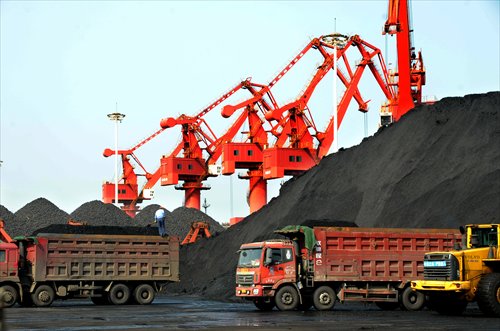HOME >> BUSINESS
China tightens rules for coal industry
By Chen Yang Source:Global Times Published: 2013-11-28 23:43:01

Trucks load imported coal at the port of Lianyungang in East China's Jiangsu Province. Photo: IC

2013 coal imports Source: General Administration of Customs
China will tighten approvals of new coal mines and ban imports of low-quality coal in order to curb the disorderly growth of coal production and promote sustainable development of the coal industry, according to a guideline released Thursday by the State Council.
New coal mines with annual output of below 300,000 tons will no longer gain approval. Existing coal mines with an output of less than 90,000 tons will be gradually eliminated from the industry, and coal mines that fail to meet safety standards will be shut down, the guideline said.
China's coal producers have been struggling with problems such as high levels of inventories, falling prices and thinner profit margins since 2012, according to the guideline, which further explained that these problems are mainly caused by industrial overcapacity, heavy tax burdens and rising production costs.
The State Council intends to crack down on illegal charges for coal firms, strengthen regulation of coal imports and exports, and create a favorable environment for the industry.
Currently, tax and other administrative charges account for 25 to 35 percent of coal firms' annual revenue. Some illegal charges levied by local governments will be cleared by the end of 2013, the guideline said.
"Elimination of illegal charges will have an immediate effect on domestic coal companies by helping them reduce operational costs," Zeng Hao, an analyst at Shanxi-based Fenwei Energy Consulting Co, told the Global Times on Thursday.
Boosted by the news, shares in major coal firms including Anyuan Coal Industry Group, China Shenhua Energy Co and Yanzhou Coal Mining Co rose by as much as 10 percent on the Shanghai and Shenzhen stock exchanges on Thursday.
"Other measures will affect market supply in the long term and help stabilize the coal market," Zeng said.
Imports of low-quality coal have risen rapidly in recent years due to a lack of regulations, not only impacting the domestic market but also causing environmental problems, the guideline said, noting that the authorities are also considering differentiating tariffs to encourage high-quality coal imports and banning coal imports with high ash and sulfur content.
The use of low-quality coal is seen as a major reason for air pollution in China's northern regions, including Beijing and neighboring Tianjin.
Beijing aims to replace 4.3 million tons of low-quality coal stored by residents in suburban areas with higher-quality coal through a subsidy program over five years starting from this year, People's Daily Overseas Edition reported on Tuesday.
"Last year, China imported 289 million tons of coal, of which low-quality coal accounted for more than 22 percent," Zhang Min, an industry analyst at commodity consultancy Sublime China Information, told the Global Times on Thursday.
"The guideline is good news for domestic coal producers, as they will have the opportunity to grab more market share," Zhang said.
China is the world's largest coal producer in terms of output, but the country's annual coal imports have outpaced its exports since 2009.
This year, its coal imports are expected to hit a record high of 320 million tons, the China National Coal Association said in a report published on Saturday.
"Coal imports from the US, Indonesia and Australia will be affected by China's tougher import regulations," Zeng said.
Posted in: Industries